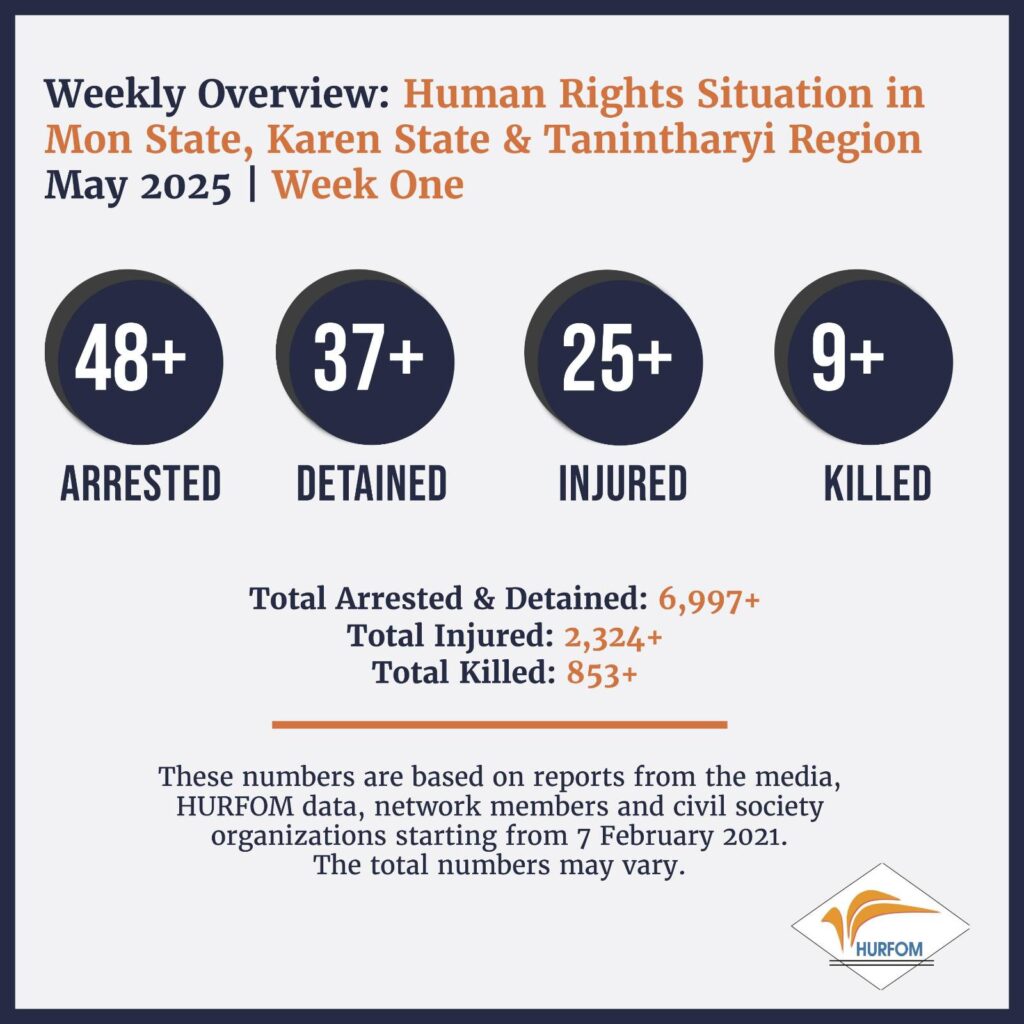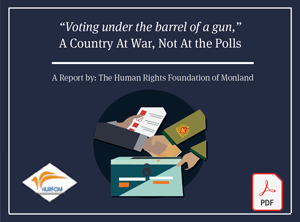Weekly Analysis: Forced Conscription Ramps Up in Mon State
May 5, 2025
The military junta is targeting youth to fight on the battlefields amid their ongoing losses of key territory and strategic positions. In target areas of the Human Rights Foundation of Monland (HURFOM), the regime’s recruitment efforts are taking a toll on youth, including women who are now also being forced to enlist. The rate of extortion, bribery, and illegal conduct by the Burmese Military is part of their brutal campaign intended to isolate and instill fear in innocent communities across the country.
In Mon State, the military junta and its appointed local administrators are intensifying efforts to forcibly recruit civilians and extort money under the guise of military conscription. These actions are linked to the regime’s plan to initiate the 13th round of People’s Military Service training, with local authorities across townships starting to collect money or individuals through coercion.

Following the enactment of the junta’s conscription law, residents of Mawlamyine, Paung, Mudon, Thanbyuzayat, Kyaikmayaw, Ye, and Kyaik Hto townships report an uptick in street-level arrests targeting young men. Junta-aligned forces are detaining youth in both public spaces and private homes—often at night—and sending them to military training camps, citing “security concerns.”
A resident in Mawlamyine described events on the morning of May 1:
“They went door to door in some neighbourhoods collecting money for the 13th round of military training. Local administrators held community meetings in certain areas, stating that households must either send a recruit or pay MMK 10,000 for some homes and up to MMK 20,000 for others. The quarter and village tract leaders are pressuring people aggressively.”
Many locals are describing this forced payment scheme as arbitrary extortion. Those who do not comply, especially youth within the eligible age range, are threatened with immediate enrollment. Some communities have received verbal warnings that those refusing to “volunteer” will be summoned and forcibly taken.
Field sources confirm that those being conscripted include people arrested at night, street detainees, suspected drug users, and others coerced into service through local administrative networks. Youth have sometimes been handed over as part of quotas or recruitment deals between local officials and the junta.
As a result, many young people across Mon State are attempting to flee to neighbouring countries. However, some have been intercepted and conscripted at border checkpoints, as the regime continues to enforce its People’s Military Service Law, enacted on January 23, 2024, which bans international travel without official junta permission for those of military age.
In addition to forced recruitment, residents report that local administrators are demanding monthly payments from communities, claiming the money is used to “secure substitutes” for conscription. Those accused of breaking local curfews or minor infractions have also been sent directly to training camps.
Despite widespread public fear and resistance, the junta officially began its 12th conscription training in Mon State on April 22, according to military-aligned propaganda outlets. Mon State Chief Minister U Aung Kyi Thein reportedly visited a group of newly conscripted youth on April 21 at the Southeastern Command’s Military Education School No. 6.

The People’s Military Service Law was introduced in 2010 under former dictator Than Shwe. The current military leadership revived it in February 2024, escalating fears of mass forced conscription nationwide.
HURFOM has documented that, between training batch 1 and batch 12, over 2,300 civilians from Mon State have been forcibly recruited. As batch 13 begins, both forced recruitment and extortion disguised as military contributions continue to devastate vulnerable communities.
Overview of Main Cases
• Youth Under Siege: Extortion, Abduction, and the Junta’s Desperate Conscription Drive
As the junta continues to lose control of territory across the country, it has launched a desperate and increasingly aggressive campaign to forcibly conscript young men. In the Tanintharyi Region, local sources confirm that junta forces are detaining youths under the pretense of enrolling them in the People’s Military Service Training Batch 13.
• Junta Shelling and Airstrikes Escalate in Kyaik Hto and Eastern Bago, Forcing Thousands to Flee
Field documentation teams have confirmed that starting from the last week of April, junta forces escalated both artillery shelling and aerial bombings across several villages located between Kyaik Hto Township in Mon State and Shwe Kyin Township in Eastern Bago Region. These attacks targeted areas without active fighting and caused multiple civilian injuries and mass displacement.
• Junta Forces Launch Three Consecutive Days of Aerial Bombings on Civilian Areas in Thayet Chaung Township, Tanintharyi
One of the most recent bombings occurred on April 29, at approximately 12:48 PM near the entrance sign of Kyauk Kha Mauk village, where a bomb dropped close to a local noodle shop. A man in his 40s was killed instantly, while Ma Mee Kam (age 47) and her teenage daughter were seriously injured. The victims were civilians with no affiliation to armed groups. Locals confirmed that the man who died was visiting from a nearby village.
• Junta Expands 4 Cuts Campaign in Tanintharyi Region, Severely Restricting Food, Fuel, and Medicine Supplies
The junta has significantly intensified its “4 Cuts” campaign across the Tanintharyi Region, expanding military deployments and fortifying defensive positions while severely restricting the flow of essential goods, including food, fuel, and medicine. Local communities face increasing hardship as heavy restrictions, arbitrary arrests, and harsh punishments are imposed on traders and civilians.
As part of these measures, junta forces have aggressively blocked the transportation of daily necessities, leading to severe shortages of rice and basic food items, skyrocketing prices, and a dramatic disruption to local trade and livelihoods.





















































